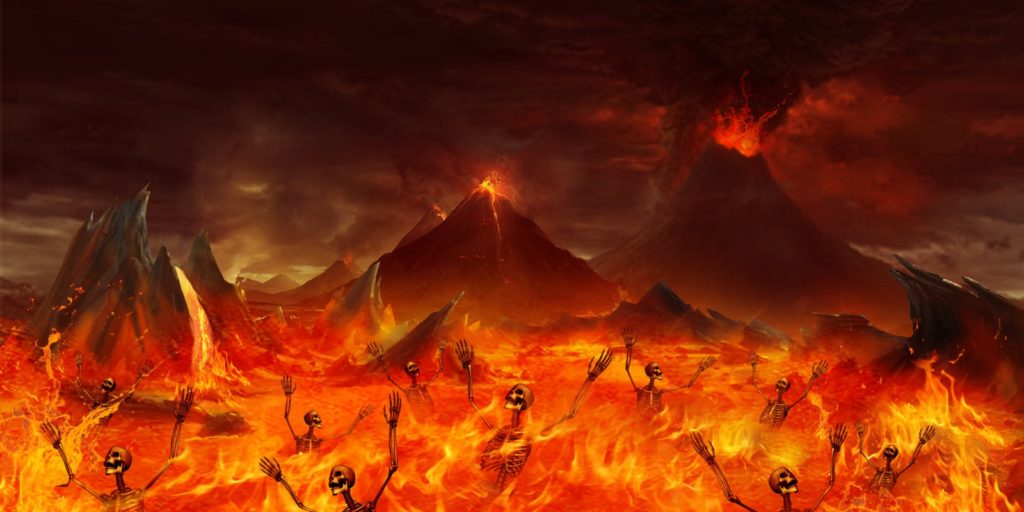
Life on Earth can seem so terrible that sometimes one asks oneself if this might be hell. It certainly seems as if we are surrounded, not only by suffering, but by beings whose true will is to increase that suffering. As this essay will elaborate, this world may be hellish, but this is actually a great spiritual opportunity in disguise.
The first thing we have to ask ourselves is what the fuck we’re doing here.
What’s apparent, after very little thought, is that we’re all going to die – therefore material concerns are meaningless. The inevitable deaths of our physical bodies mean that it’s meaningless to accumulate wealth, or status, or even memories of pleasure. All is rendered null upon the utterly inescapable expiration of our physical bodies.
The purpose of being in this place must therefore be something spiritual.
Elementalists believe that the cessation of suffering comes from raising the frequency of one’s consciousness. Elementalism teaches of a great spiritual axis that stretches from perfect harmony with the Principle of Evil in the lowest place, to perfect harmony with the Will of God in the highest. The purpose of life in the hellish realms is to transmute that frequency of consciousness into the highest possible form.
This is achieved by saying Yes to that which God says Yes to, and saying No to that which God says No to, and saying Yes to that which the Principle of Evil says No to, and saying No to that which the Principle of Evil says Yes to.
The more evil there is in the world, the more opportunity there is for us to defy the Will of the Principle of Evil. The more savagery, brutality, callousness and neglect in the world, the more opportunity to act work in favour of civility, class, compassion and good cheer.
If we had incarnated into one of the heavenly realms, there would be little to do other than just chill out. That’s great fun if one is of a high spiritual frequency, because then one gets to experience the pleasure of interacting with other beings of high spiritual frequency. Every moment is a blissful revealing of some astonishing novelty.
If one is of a low spiritual frequency, however, it’s not enjoyable to incarnate in the higher realms, because one will get rejected by the beings that inhabit them. In most cases, those beings will not want to sully themselves by interacting with a being of a low frequency, any more than a group of humans would invite a pig to dine with them at a restaurant. And the difference in frequency between beings of two different realms can be much, much greater than the difference in frequency between humans and pigs.
After enough time has been spent being shunned and rejected, most beings realise that they don’t really belong in such a realm, around high-frequency beings. The sense of loneliness that they feel will eventually become overwhelming. And so they will incarnate, by choice, into the hellish realms, where the density of the world affords the opportunity to radically alter one’s frequency of consciousness.
In these hellish realms, one is confronted with the reality of death, which does not exist in the heavenly realms. The reality of death makes it possible for us to say No to it. All creatures that are born must die, but to dwell on this is to miss the point. The point is that by working to say No to death in this realm, we work to align our consciousness with the Will of God.
Even without the threat of death, suffering is ever-present in any realm below the heavenly ones. So by working to say No to suffering in this realm, we can also work to align our consciousness with the Will of God.
Any being that enters one of the hellish realms, and then works to say No to suffering and death, will raise the frequency of their consciousness. Raise it high enough, and it will become possible, after death, for them to be welcomed into the next world as a hero. In any case, they will get a realm full of beings who are a fractal expression of their own frequency, as per the Law of Assortative Reincarnation.
If one has raised their frequency of consciousness high enough, then incarnating into the next world will come as a great relief. One will be reunited with the frequencies that one encountered in one’s past lives, and on the best possible terms.
If not, one will incarnate into next world imperfect. This might also come as a relief, as one might still be liberated from the sensations of suffering that accompany existence in this hellish world. This relief, however, will soon turn to dismay, as the beings in the higher world come to reject one for being of such a low frequency of consciousness.
Many might prefer, in such an instance, to incarnate into one of the hellish realms. Rather than being shunned by high-frequency beings in one of the heavenly realms, and suffering the immense loneliness that ensues, many would prefer to wage spiritual warfare with the Principle of Evil here in one of the hellish realms. The rewards are much greater and much more immediate.
Being here, in this hellish realm, could be thought of as much like moving overseas for a higher income. It’s scary, challenging and often frightening and unpleasant, but the rewards are much greater than remaining in comfort. The hellish nature of this place creates such a powerful temptation to do evil that truly heroic resistance to that evil becomes possible.
Ultimately, then: this world may be hell, but that’s a good thing, because it gives us a chance to rapidly and dramatically change the frequency of our consciousness. With a sufficient effort of will, it’s possible to transmute even the nastiest and most bestial consciousness into something angelic.
If this world were less hellish, and if the suffering here would be less intense, the opportunity to transmute the frequency of one’s consciousness would be less. The decisions we made would be less impactful, because the influence of the Principle of Evil would be much weaker. Only a very gradual shift in frequency would be possible.
There are realms more hellish than this. Let us work to not go there!
*
If you enjoyed reading this essay/article, you can get a compilation of the Best VJMP Essays and Articles of 2019 from Amazon for Kindle or Amazon for CreateSpace (for international readers), or TradeMe (for Kiwis). A compilation of the Best VJMP Essays and Articles of 2018 and the Best VJMP Essays and Articles of 2017 are also available.
*
If you would like to support our work in other ways, please consider subscribing to our SubscribeStar fund. Even better, buy any one of our books!



